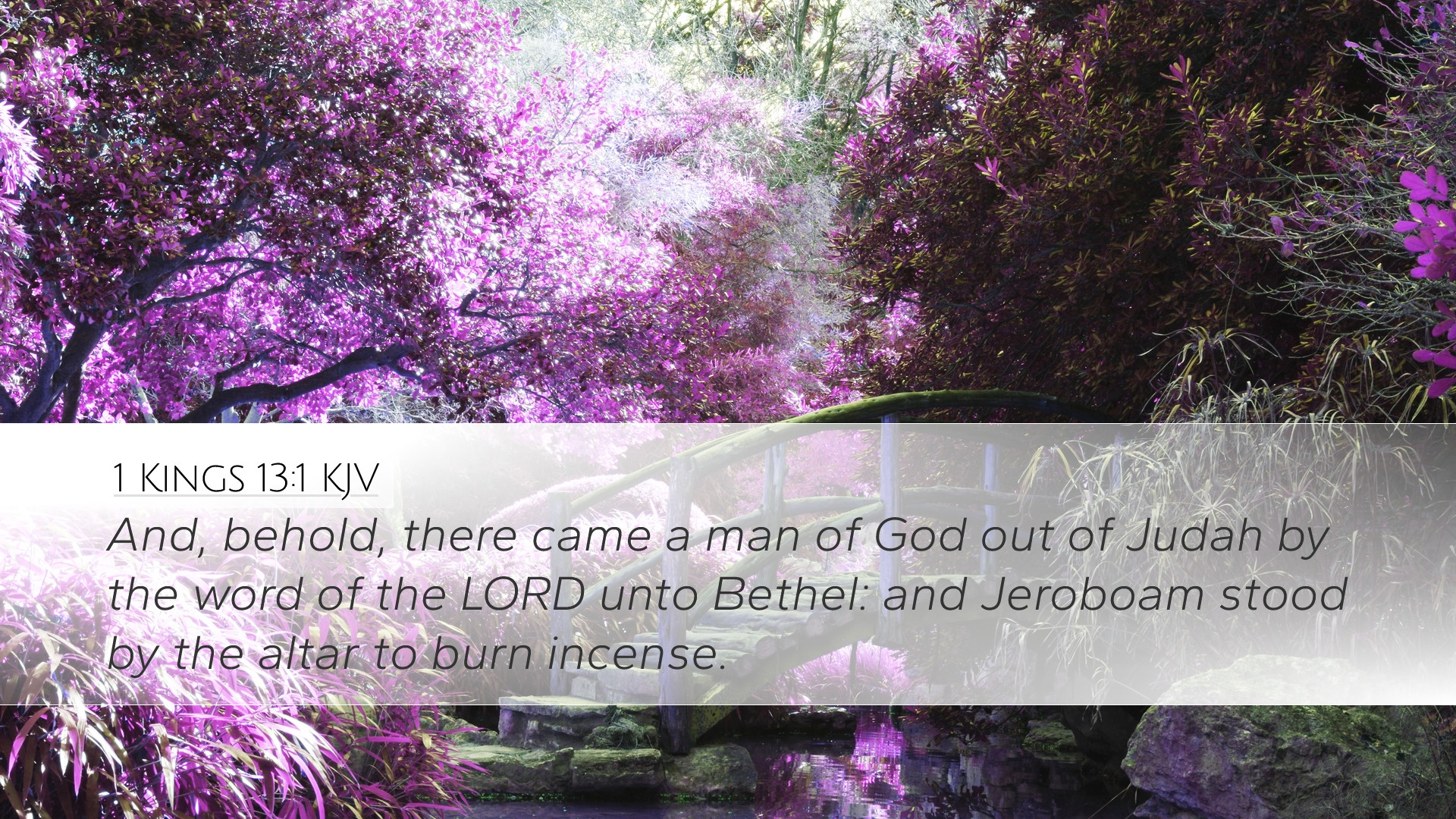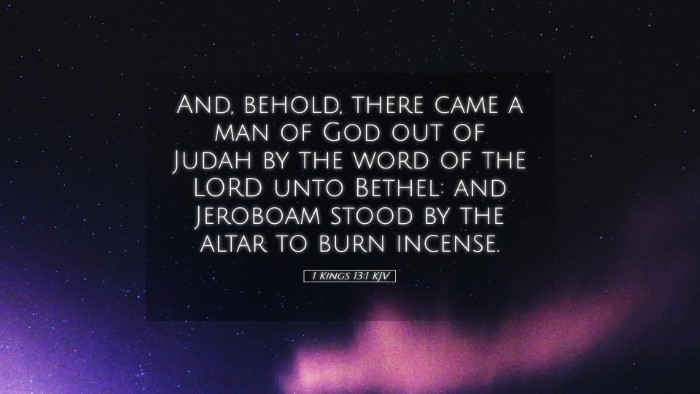Commentary on 1 Kings 13:1
Text of the Verse: "And, behold, there came a man of God out of Judah by the word of the Lord unto Bethel: and Jeroboam stood by the altar to burn incense."
Introduction
The passage of 1 Kings 13:1 introduces a significant moment in the history of Israel, where the prophet from Judah confronts King Jeroboam during a pivotal moment of idolatry. This commentary seeks to extract profound theological insights and applications from this event, drawing from the wisdom of esteemed public domain commentaries.
The Prophet's Origin and Mission
The phrase "there came a man of God out of Judah" indicates the prophet’s divine commission and the geographical significance of his origin. It symbolizes a sent messenger whose authority derives solely from God:
-
Matthew Henry: notes the contrast between the prophet's submission to God's word and the king's rebellious actions. The prophet is identified with the true God, tasked to declare judgment upon Jeroboam's altar.
-
Albert Barnes: emphasizes that the prophet's journey reflects obedience and the dangerous circumstances that believers often face when confronting authority that strays from divine law.
-
Adam Clarke: points out that the term "man of God" signifies not just his prophetic role but also his moral integrity, indicating a life dedicated to God's service.
Jeroboam's Actions
The context of Jeroboam standing by the altar to burn incense is critical in understanding the narrative:
-
Matthew Henry: interprets Jeroboam's act as a direct contravention of God's commandments, resulting in God's judgment against his northern kingdom.
-
Albert Barnes: describes how Jeroboam's idolatry signifies the broader apostasy within Israel. It serves as a reminder that leaders have a heavy responsibility to uphold divine principles.
-
Adam Clarke: expands on the symbolism of incense, representing prayers and offerings, which were to be made only in the temple in Jerusalem, further demonstrating the gravity of Jeroboam’s actions.
The Significance of the Altar
The altar at Bethel serves as a symbol of the spiritual decline of Israel. The prophet’s approach signifies God's intervention in human affairs:
-
Matthew Henry: stresses that the altar, as a place of worship, had become a site of idolatry; thus, the prophet's message is meant to restore true worship.
-
Albert Barnes: indicates that the altar represents all false worship that the nation had embraced, marking a historical turning point in Israel's faithfulness to Yahweh.
-
Adam Clarke: critiques how the physical alteration of worship spaces leads to spiritual corruption, cautioning believers about modern worship practices and their alignment with Scripture.
The Divine Commission
The phrase "by the word of the Lord" underscores that the prophet's actions are divinely ordained. This truth echoes throughout Scripture, highlighting the importance of divine call in ministry:
-
Matthew Henry: insists that ministry must be founded on Scripture, warning against any alteration of God’s word in the name of convenience or cultural relevance.
-
Albert Barnes: notes that the phrase denotes the authority of the prophet, serving as a reminder that true prophets act only at God's command, not according to personal ambitions or societal pressures.
-
Adam Clarke: emphasizes the necessity of divine direction in the ministry, associating success with fidelity to God's commands, rather than personal prowess or charisma.
Theological Implications
This verse offers rich theological insights that resonate with contemporary challenges in the faith community:
-
Responsibility of Leadership: Leaders, like Jeroboam, hold immense responsibility in steering their communities toward faithfulness to God.
-
God's Sovereignty: The sending of the prophet reveals God's sovereignty and commitment to His covenant people, showing that He intervenes in human affairs to redirect them back to Himself.
-
True Worship: The stark contrast between idolatry and the worship of the true God challenges the modern church to examine the authenticity of its worship practices.
Practical Applications for Today
The narrative of 1 Kings 13:1 has practical applications for today’s believers and church leaders:
-
Discernment in Leadership: Leaders must be vigilant to receive God's guidance and resist the temptation to lead their communities away from biblical principles.
-
Commitment to God's Word: The authority of God's word should be central in all ministry endeavors, reminding believers that their actions must align with biblical truth.
-
Call to Repentance: Just as the prophet called for repentance, today’s church must boldly call its members to turn from any deviations from Scripture.
Conclusion
1 Kings 13:1 serves as a powerful reminder of God's zealous commitment to His people and the critical importance of prophetic voices in the face of idolatry. The church today is called to heed these lessons, ensuring that worship remains true to the God who commands it. In a world full of distractions and false gods, the faithful must stand firm in the truth revealed in Scripture, like the man of God from Judah, confronting the erroneous paths of contemporary society.


